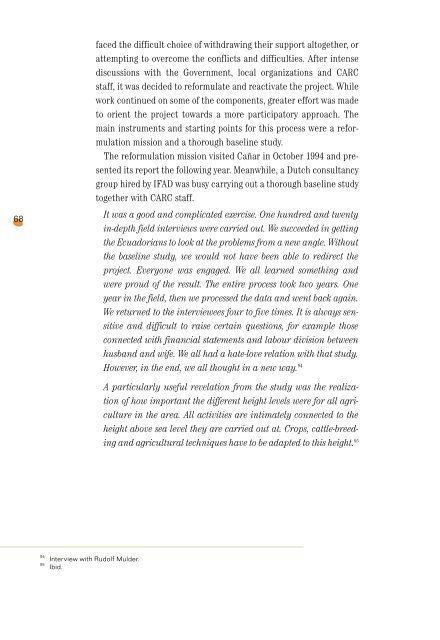mishqui-yacu, sweet water - IFAD
mishqui-yacu, sweet water - IFAD
mishqui-yacu, sweet water - IFAD
Create successful ePaper yourself
Turn your PDF publications into a flip-book with our unique Google optimized e-Paper software.
68<br />
faced the difficult choice of withdrawing their support altogether, or<br />
attempting to overcome the conflicts and difficulties. After intense<br />
discussions with the Government, local organizations and CARC<br />
staff, it was decided to reformulate and reactivate the project. While<br />
work continued on some of the components, greater effort was made<br />
to orient the project towards a more participatory approach. The<br />
main instruments and starting points for this process were a reformulation<br />
mission and a thorough baseline study.<br />
The reformulation mission visited Cañar in October 1994 and presented<br />
its report the following year. Meanwhile, a Dutch consultancy<br />
group hired by <strong>IFAD</strong> was busy carrying out a thorough baseline study<br />
together with CARC staff.<br />
It was a good and complicated exercise. One hundred and twenty<br />
in-depth field interviews were carried out. We succeeded in getting<br />
the Ecuadorians to look at the problems from a new angle. Without<br />
the baseline study, we would not have been able to redirect the<br />
project. Everyone was engaged. We all learned something and<br />
were proud of the result. The entire process took two years. One<br />
year in the field, then we processed the data and went back again.<br />
We returned to the interviewees four to five times. It is always sensitive<br />
and difficult to raise certain questions, for example those<br />
connected with financial statements and labour division between<br />
husband and wife. We all had a hate-love relation with that study.<br />
However, in the end, we all thought in a new way. 94<br />
A particularly useful revelation from the study was the realization<br />
of how important the different height levels were for all agriculture<br />
in the area. All activities are intimately connected to the<br />
height above sea level they are carried out at. Crops, cattle-breeding<br />
and agricultural techniques have to be adapted to this height. 95<br />
94<br />
95<br />
Interview with Rudolf Mulder.<br />
Ibid.
















